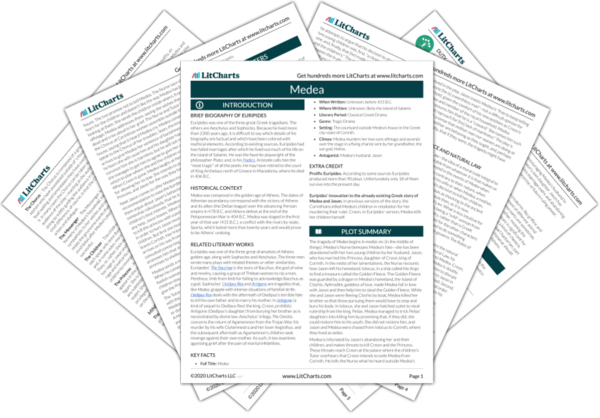Summary
Analysis
Aegeus says he is keen to help Medea for the gods' and for the promise of children. He says that if Medea can come to his land (Athens) he will try to be her patron but, he insists, he will not take her with him from Corinth. She must reach his home by her own devices. He doesn't want his Corinthian friends to blame him for giving her refuge. Medea asks him for a pledge. She says that she trusts him, but if he is bound by oath he is less likely to give her up to her enemies if they pursue her.
Aegeus' reticence to help Medea does something to counter the narrative implausibility of his sudden arrival in Corinth. We catch a glimpse of the rationale of a ruler considering to grant refuge to exile and there is even a hint the Aegeus suspects that Medea's enemies will pursue her in the hopes of punishing her for her crimes.
Themes
Aegeus compliments Medea on her foresight and gives her his oath on the gods she names, Earth and Sun. He swears never to expel her from his land and never willingly to give her up to her enemies. She wishes Aegeus luck on his journey and swears she will reach his city soon. The Chorus makes a prayer to Hermes, the messenger god and god of travellers, to guide Aegeus home. Aegeus exits.
We see that, in the ancient world, not all men think intelligence and foresight are characteristics unbecoming of women. Significantly, Aegeus swears by the Sun (Helios), Medea's grandfather, to give Medea refuge and, in doing so, his kindly offer solidifies into a duty. This also serves to highlight the oaths that Jason made to Medea—oaths of marriage—which Jason broke. The Chorus approves of Aegeus' behavior and the help he offers Medea. He has made a wise stipulation and a just oath.
Themes
In a long soliloquy, Medea swears by Zeus and Justice that she will triumph over her enemies. She acknowledges the fortunate coincidence of Aegeus' arrival and takes it as a sign from the gods. She reveals her plan to have a servant fetch Jason back to her so that she can speak submissively and beg that the children might be allowed to stay in Corinth. She will use them, she says, in a plot to kill the Princess by sending them to her with poisoned gifts, a dress and a golden crown.
Medea acknowledges the convenience of Aegeus' coincidental arrival for her plot for vengeance and escape and attributes it to divine will. Medea spells out her intentions to kill the Princess for the first time here in full detail, and reveals the symbolic means for her murder, a poisoned crown signifying Jason and Creon's polluting the royal line (and thus their rulership) with reprehensible behavior and injustice.
Themes
If the Princess takes the dress and crown and lets them touch her skin, Medea says, the Princess will die horribly—so will anyone who touches her and comes in contact with the poison. Then, she says, though it causes her grief, the next step will be to kill her children. She will demolish Jason's whole house and leave the country. She says she can endure the unholy crime of murdering her sons over the mockery of her enemies. What's the point of living without a country, home, or refuge, she asks. Her mistake was leaving home at all. She prays that no one ever see her as week or submissive.
Once again we see the not altogether pro-woman construction of the plot. The Princess, almost innocent as far as Medea is concerned, will serve as a kind of sacrificial victim to punish the men who have caused Medea injury. Medea acknowledges outright her intention to kill her own children, for some reason seeing it as a necessary conclusion of the violence she intends to wreak on the Princess and Creon. She thinks it to be an action so bold and rash that it will leave her enemies speechless. Medea, so furious at having been made weak and submissive because she is a woman, wants never to be seen as being weak and submissive again—and is willing to break the natural law of motherhood by murdering her own children in order to make that so.
Themes
Get the entire Medea LitChart as a printable PDF.

The Chorus says that because Medea shared her plan, it wants to help her, but says it can't reject the laws of human life and urges her not to carry out her plan. Medea says the Chorus hasn't suffered as she has and so can't understand. Killing her own children, she says, is the way to hurt her husband most. The Chorus says it will make her the most unhappy woman. Medea says she doesn't care. It is no time for moderation. She sends a member of the Chorus to get Jason. The Chorus member exits.
The Chorus takes the paradoxical position of offering Medea its support yet attempting to dissuade her from her course of action. Medea attributes the rashness of her action to the intensity of her suffering. Medea is so determined that she is willing to cause herself great pain and suffering simply to punish Jason. Medea thinks that it is a time for excess and passion rather than restraint.
Themes












